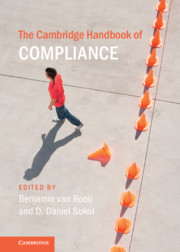Book contents
- The Cambridge Handbook of Compliance
- The Cambridge Handbook of Compliance
- Copyright page
- Contents
- Figures
- Tables
- Contributors
- 1 Introduction: Compliance as the Interaction between Rules and Behavior
- Part I Compliance Concepts and Approaches
- Part II Deterrence and Incapacitation
- Part III Incentives
- Part IV Legitimacy and Social Norms
- Part V Capacity and Opportunity
- Part VI Compliance and Cognition
- Part VII Management and Organizational Processes
- 39 Compliance Management Systems: Do They Make a Difference?
- 40 Business Codes: A Review of the Literature
- 41 Third Party and Appointed Monitorships
- 42 Ethics and Compliance Training
- 43 The Social and Organizational Psychology of Compliance: How Organizational Culture Impacts on (Un)ethical Behavior
- 44 Organizational Factors and Workplace Deviance: Influences of Abusive Supervision, Dysfunctional Employees, and Toxic Work Environments
- 45 Corporate Social Responsibility, ESG, and Compliance
- 46 Agency, Authority, and Compliance
- 47 Life-Course Criminology and Corporate Offending
- Part VIII Measuring and Evaluating Compliance
- Part IX Analysis of Particular Fields
- References
43 - The Social and Organizational Psychology of Compliance: How Organizational Culture Impacts on (Un)ethical Behavior
from Part VII - Management and Organizational Processes
Published online by Cambridge University Press: 07 May 2021
- The Cambridge Handbook of Compliance
- The Cambridge Handbook of Compliance
- Copyright page
- Contents
- Figures
- Tables
- Contributors
- 1 Introduction: Compliance as the Interaction between Rules and Behavior
- Part I Compliance Concepts and Approaches
- Part II Deterrence and Incapacitation
- Part III Incentives
- Part IV Legitimacy and Social Norms
- Part V Capacity and Opportunity
- Part VI Compliance and Cognition
- Part VII Management and Organizational Processes
- 39 Compliance Management Systems: Do They Make a Difference?
- 40 Business Codes: A Review of the Literature
- 41 Third Party and Appointed Monitorships
- 42 Ethics and Compliance Training
- 43 The Social and Organizational Psychology of Compliance: How Organizational Culture Impacts on (Un)ethical Behavior
- 44 Organizational Factors and Workplace Deviance: Influences of Abusive Supervision, Dysfunctional Employees, and Toxic Work Environments
- 45 Corporate Social Responsibility, ESG, and Compliance
- 46 Agency, Authority, and Compliance
- 47 Life-Course Criminology and Corporate Offending
- Part VIII Measuring and Evaluating Compliance
- Part IX Analysis of Particular Fields
- References
Summary
Abstract: In psychological theory and research, compliance is generally seen as the most superficial and weakest form of behavioral adaptation. The current contribution examines how the social context of work – the organizational culture – can be organized to stimulate ethical business conduct. By reviewing social psychological theory and research, we illustrate how an ethical culture can be developed and maintained through ethical leadership and by mainstreaming ethics into existing business models. This is markedly different from more common legal approaches. It requires that a commitment to ethical business conduct is visible from the tone at the top, that organizational leaders “walk the talk” on the work floor, and that this matches the implicit messages that organizational members receive on a day-to-day basis about what really matters and what should be prioritized. Attempts to increase rule compliance are bound to fail when organizational incentives and rewards focus on individual bottom-line achievement regardless of how this is done. Empirical evidence supports the claim that organizational culture is an important factor in stimulating ethical conduct. By creating an ethical culture, organizations develop an “ethical mindset” in organizational members, which helps them not only to understand and internalize existing guidelines in their current work but also to apply the “spirit” of these guidelines to new dilemmas and emerging situations. This makes investing in an ethical culture a sustainable business solution.
- Type
- Chapter
- Information
- The Cambridge Handbook of Compliance , pp. 626 - 638Publisher: Cambridge University PressPrint publication year: 2021
References
- 2
- Cited by



